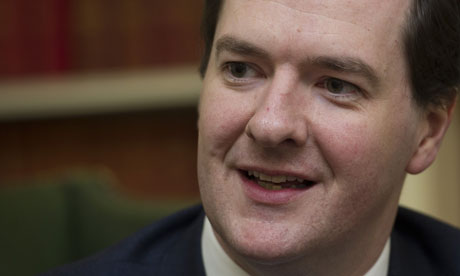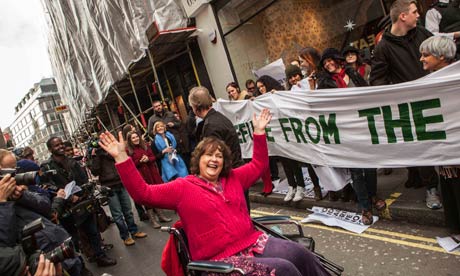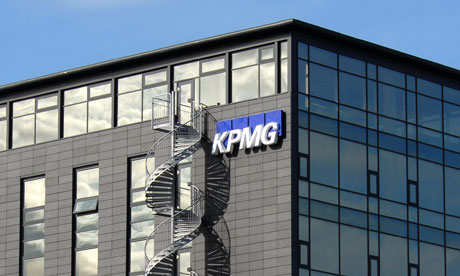George Osborne has pulled off a stunning confidence trick: he has bamboozled people into thinking he is fighting tax dodgers

‘Chancellor George Osborne's new rules – as KPMG makes clear – give “UK-based multinationals an opportunity to significantly reduce their tax rate”.’ Photograph: Carl Court/AFP/Getty Images
Chancellors of the exchequer have never been entirely straight about their tinkering with the tax system. With his penchant for "stealth taxes", Gordon Brown certainly didn't always come clean with the British public. But when it comes to the vexed subject of tax avoidance, his successor George Osborne has taken the deception to a new level and, after three years, pulled off a stunning confidence trick.
"The parties agree that tackling tax avoidance is essential for the new government, and that all efforts will be made to do so," declared the coalition agreement in May 2010. The commitment was a victory for the Lib Dems and for their pre-election shadow chancellor Vince Cable in particular. A year earlier, Cable had responded to the Guardian's Tax Gap series by writing: "Systematic tax avoidance by rich individuals and UK-based companies strikes a particularly ugly note in these straitened times."
Cable's prize was to be a "general anti-avoidance rule", and soon enough one of Britain's leading tax QCs, Graham Aaronson, was dispatched to work up the scheme that Osborne has promised to introduce in this week's budget. But it will be what Aaronson describes as "narrowly focused", and apply only to the "most egregious tax avoidance schemes". For which, read convoluted arrangements involving multiple transactions that circumvent the spirit of the law – of the sort deployed by comedian Jimmy Carr before he saw the light (or the headlights of career death hurtling towards him).
Scheming of this type is, however, a relative minority sport, and is generally defeated by judges increasingly intolerant of tax avoidance anyway. Worse still, the senior tax inspectors' union argues that, by hitting just "egregious" cases, the new law risks "actually facilitating avoidance".
By far the costliest tax avoidance takes the form of the corporate structuring that has repeatedly hit the front pages in the last couple of years, whether through Starbucks' payment of royalties to Amsterdam, Amazon's Luxembourg sales hub or Vodafone's multibillion-pound internal financing arrangements through the same grand duchy. And,as the Lords economic affairs committee pointed out last week: "There is a misconception that Gaar [general anti-abuse rules] will mean the likes of Starbucks and Amazon will be slapped with massive tax bills. This is wrong, and the government need to explain that to the public."
Such corporate manouevrings do not officially constitute tax avoidance even if, on any commonsense view, that is exactly what they are. When a couple of years ago the BBC commissioned a ComRes survey on attitudes to tax avoidance, it defined the practice as "where people or businesses arrange their financial affairs to minimise the amount of tax they pay while remaining within the law". Eighty four percent of people favoured a clampdown on the behaviour, which clearly encompasses multinational's offshore structures.
Yet this is where the great tax trick is played. Outside the official definition of tax avoidance, the offshore schemes of Britain's biggest multinationals have not just escaped any clampdown, they have been rewarded with a rewriting of corporate tax law that makes them more irresistible than ever. Working closely with the companies most affected, in his last two budgets Osborne has relaxed – almost to the point of obsolescence – the so-called controlled foreign companies laws that were introduced by Nigel Lawson in the early 1980s to prevent companies shifting profits into their tax-haven subsidiaries.
From this year offshore financing structures such as Vodafone's, for instance, will be taxed at no more than 5%, while companies' tax-haven branches will be exempt from tax. Incredibly, the British government is subsidising the largest companies to send billions of pounds into the world's tax havens. And in the absence of any opposition from the Labour party – compromised by its own record of offshore tax relaxations and now advised by Vodafone's tax consultant PricewaterhouseCoopers – the new laws have arrived on the statute book unchallenged.
The big four accountancy and tax consulting firms that were hauled before Margaret Hodge's public accounts committee a few weeks ago are probably licking their lips. KPMG touts for business in one of its pamphlets by pointing out: "For every £1m of finance income received in the UK, the finance company regime could save cash tax of £165,000." And even better: "As the new rules have been designed and enacted by the government, this should represent a low-risk tax-saving opportunity." What could be sweeter than state-endorsed tax avoidance?
This surreptitious slashing of corporate tax bills is not something the government is keen to dwell on. Indeed, the rhetoric can be very different. In Davos, David Cameron said that businesses are "setting up ever more complex tax arrangements abroad to squeeze their tax bills right down ... Well, they need to wake up and smell the coffee". Given low corporate tax rates, soon to be 21% and by far the lowest among G8 countries, the PM insists they "should pay that rate of tax rather than avoid it".
But Osborne's new rules – as KPMG makes clear – give "UK based multinationals an opportunity to significantly reduce their tax rate". In other words, using "tax arrangements abroad" the largest multinationals won't pay even the new all-time-low headline tax rates.
Through the "general anti-avoidance rule" and a regular stream of smaller specific anti-avoidance announcements, such as this weekend's move against a national insurance dodge, Osborne will sustain the illusion that tax avoidance is being fought on all fronts, confident that his bamboozled audience will never notice the abject surrender on the most important one of all.




